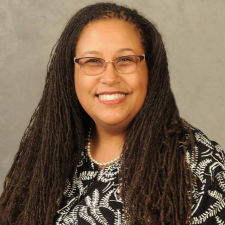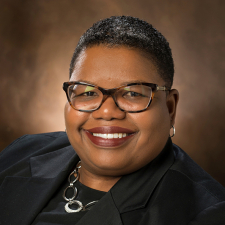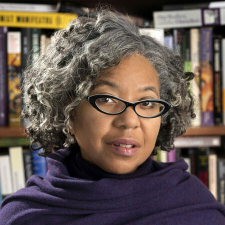Type: Lab
Engaging Opera as Popular Culture and Social Justice
Naomi André
March 4, 2022
In this talk I outline some of the larger frameworks from my book Black Opera: History, Power, Engagement (University of Illinois Press, 2018) and take them further to include a quick mention of Beyoncé's "Homecoming" (2018), and three operas on Black topics that debuted the summer of 2019 (Terence Blanchard and Kasi Lemmons, "Fire Shut Up in My Bones," Opera Theater of St. Louis and then the Metropolitan Opera in NYC 2022; Anthony Davis and Richard Wesley, "The Central Park Five," Long Beach Opera; and Jeanine Tesori and Tazewell Thompson, "Blue," Glimmerglass Festival). I quickly contextualize "Fire Shut Up in My Bones" and "The Central Park Five" and then spend the most time with "Blue." I have been fortunate to see all three operas and got to know Tesori and Thompson through several panels in the Breaking Glass series (run by Glimmerglass Opera Festival). From the legacy of minstrelsy and the frequent negative portrayal of Blackness in opera, this talk outlines a shadow history and explores how opera can be relevant for today and a space of liberation.
Naomi André is Professor in Women's Studies, the Department of Afroamerican and African Studies, and the Residential College Arts and Ideas in the Humanities program at the University of Michigan. Her books, Voicing Gender: Castrati, Travesti, and the Second Woman in Early Nineteenth-Century Italian Opera (Indiana UP, 2006) and Blackness in Opera (University of Illinois Press, 2012; edited collection) focus on opera from the nineteenth to the mid-twentieth centuries and explore constructions of gender, race and identity. She recently published Black Opera: History, Power, Engagement with University of Illinois Press, a monograph on staging race and history in opera today in the United States and South Africa.
This Music is Black Music: Mary Lou Williams and the Identity Politics of Jazz in Black Power-Era America
Tammy L. Kernodle
September 23, 2022
One of the significant aspects of contemporary jazz scholarship has been its role in illuminating how the jazz community aligned itself with the activity and ideology that defined the mid-century black civil rights movement. The framing of this epoch has largely centered on the relationships musicians formed with movement organizations (e.g., SNCC, CORE, SCLC), how liberation ideology informed specific works, and how it underscored the musical experimentation of the jazz avant garde. My work, however, seeks to illuminate the ways in which the influence of movement ideology extended more deeply into the interiority of the 1960s jazz community and defined the ways in which black women musicians engaged with and nurtured a new generation of musicians and listeners.
While not as vocal in her support of the black civil rights movement as many of her peers, pianist/arranger Mary Lou Williams, embarked on a crusade that sought to reclaim and illuminate the cultural roots of jazz during sixties and seventies. She shed the publicly mediated image of pioneering jazz musician and assumed the role of cultural worker-serving both the jazz community and the general public. Williams’ music during this period mirrored the protest songs of Odetta, Fannie Lou Hamer, and Nina Simone in accentuating and reclaiming the themes of resistance, resilience, and spirituality that have been prevalent in black music since its beginnings. Beyond these compositions, it was Williams’ assertions that jazz evolved out of “the suffering of slaves” and her development of a historical and pedagogical frameworks that invoked jazz’s “black heritage” that most strongly linked her with the wave of cultural nationalism that emerged out of the mid-century black civil rights movement. This presentation examines these connections through Williams’ work with community-based organizations, public lectures, and teaching.
Tammy L. Kernodle is the author of Soul on Soul: The Life and Music of Mary Lou Williams (University of Illinois Press, 2020) and served as Associate Editor of the three-volume Encyclopedia of African American Music. She has worked closely with educational programs including The American Jazz Museum, National Museum of African American History and Culture, NPR, the Rock and Roll Hall of Fame, the BBC, Carnegie Hall and New World Symphony. She is the immediate Past President of the Society for American Music and is University Distinguished Professor of Music at Miami University in Oxford, OH.
This Wretched Enchantment: George Gershwin, DuBose Hayward and the Invention of ‘Black’ Women’s Sound
Daphne A. Brooks
September 22, 2023
Daphne A. Brooks is William R. Kenan, Jr. Professor of African American Studies, American Studies, Women's, Gender, and Sexuality Studies, and Music at Yale University. She is the author of Bodies in Dissent: Spectacular Performances of Race and Freedom, 1850-1910 (Duke UP, 2006), winner of The Errol Hill Award for Outstanding Scholarship on African American Performance from ASTR; Jeff Buckley's Grace (New York: Continuum, 2005) and Liner Notes for the Revolution: The Intellectual Life of Black Feminist Sound (Harvard University, Feb 2021).
Brooks has authored numerous articles on race, gender, performance and popular music culture. She is also the author of the liner notes for The Complete Tammi Terrell(Universal A&R, 2010) and Take a Look: Aretha Franklin Complete on Columbia (Sony, 2011), each of which has won the ASCAP Deems Taylor Award for outstanding music writing, and her liner notes essay for Prince's Sign O' The Times deluxe box set was published in fall of 2020. She is the co-founder and co-director of Yale University's Black Sound & the Archive Working Group, a 320 York Humanities Initiative. Her writing has appeared in The New York Times, The Nation, The Guardian, Pitchfork.com, and other press outlets.
Brooks is currently editing an anthology of essays forthcoming from Duke University Press and culled from Blackstar Rising & The Purple Reign: Celebrating the Legacies of David Bowie and Prince, an international 3-day conference and concert which she curated.


